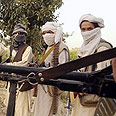
Lessons from Afghanistan
Israel must pay attention to US willingness to engage in dialogue with enemies
At this time, a special American team is completing an extraordinary journey in Afghanistan and Pakistan. Accompanied by a group of journalists from America’s leading newspapers, President Obama’s special envoy Richard Holbrooke and Chairman of the Joint Chiefs of Staff Mullen held talks with top government officials in both countries. At the same time, they also held special meetings with enemy commanders – the Taliban – in the presence of the journalists. These meetings were attended, among others, by a senior Taliban fighter who spent years in the Guantanamo detention camp.
The Americans’ objective was not to make clear the policy which the world’s greatest power intends to adopt. They traveled all the way from Washington first and foremost to seek the advice of the “moderates among their enemies” in respect to the complex situation created in the wake of eight years of war. The chairman of the Joint Chiefs of Staff said there, for example, that it took the US too long to recognize the damage caused by searches at houses and by bombings; he pledged to consider ways to minimize the suffering of the civilian population.
Holbrooke, a veteran senior diplomat known for his toughness, virtually begged religious leaders for advice on how to reconcile with the radical and cruel Taliban, which serves as the patron of al-Qaeda terrorists. The names of the participants in the meetings were kept secret lest they be hurt later, yet based on credible sources the “philosophy” of the Guantanamo detainee is much more radical than that of Hamas in Gaza.
The messages conveyed by the Americans included a declared intention to invest resources and significant funds in promoting Afghanistan’s backward economy, developing agriculture that grows food instead of drugs, and constructing a network of roads and community centers. All of this will be undertaken while NATO armies under US command continue their all-out war, alongside this “economic peace” effort.
Another message conveyed by Washington was that the US will not favor one candidate over another in the upcoming presidential elections in Afghanistan. This includes President Hamid Karzai, who enjoyed massive aid since he was elected with the support of the “previous’ Washington in 2004. The emissaries made clear that the US will cooperate with whoever is elected.
At this time, Obama is focusing his policy on the Afghanistan-Pakistan question, in an effort to register significant and rapid achievements, disengage from the Afghanistan war, and focus on the main objective: The international threat posed by Islamic terrorism.
Seeking alternatives
The extraordinary move undertaken by Holbrooke and Mullen in their last tour illustrates one of the most interesting and challenging hallmarks of the new administration. While military forces on the ground are preparing for a spring offensive characterized as “decisive,” those who lead the campaign are seeking diplomatic alternatives while seriously looking into agreements with various enemy camps and groups. The Americans are not concerned that the enemy will interpret such moves as a sign of weakness – the opposite is true.And so, a superpower that has great confidence in itself and its power, and which demonstrates its strength in daily operations on the battlefield, is seriously looking into innovative and dramatic options that will improve its position vis-à-vis the most radical enemy members, while openly declaring its moves via its most senior journalists.
There are indications that the administration is initiating unusual moves in other areas of the globe as well. The more we are able to invest candid and serious efforts in developing creative and credible alternatives to the main issues on our agenda, the greater the chances that we shall find in the US a partner to bold diplomatic moves – both when it comes to the essence and to the modus operandi.
If we fail to do it ourselves, we should not be complaining if Washington does it before us, and without us.










